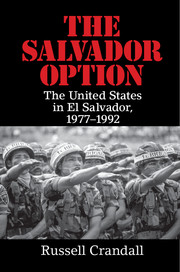Book contents
- Frontmatter
- Dedication
- Epigraph
- Contents
- List of Figures
- List of Organizations
- Acknowledgments
- 1 Introduction
- PART ONE EL SALVADOR IN THE COLD WAR
- PART TWO JIMMY CARTER
- 7 Revolution and Counterinsurgency in Guatemala
- 8 Mass Organizations
- 9 Carter Arrives
- 10 Carter and the Sandinista Revolution in Nicaragua, 1979
- 11 An October Coup
- 12 Carter Engages Salvador
- 13 Archbishop Romero
- 14 Land
- 15 The American Churchwomen
- 16 Arming the Rebels
- 17 Guerrilla Final Offensive, January 1981
- 18 Death Squads
- PART THREE RONALD REAGAN
- PART FOUR GEORGE H. W. BUSH
- PART FIVE POSTWAR
- Notes
- Bibliography
- Index
13 - Archbishop Romero
from PART TWO - JIMMY CARTER
Published online by Cambridge University Press: 05 June 2016
- Frontmatter
- Dedication
- Epigraph
- Contents
- List of Figures
- List of Organizations
- Acknowledgments
- 1 Introduction
- PART ONE EL SALVADOR IN THE COLD WAR
- PART TWO JIMMY CARTER
- 7 Revolution and Counterinsurgency in Guatemala
- 8 Mass Organizations
- 9 Carter Arrives
- 10 Carter and the Sandinista Revolution in Nicaragua, 1979
- 11 An October Coup
- 12 Carter Engages Salvador
- 13 Archbishop Romero
- 14 Land
- 15 The American Churchwomen
- 16 Arming the Rebels
- 17 Guerrilla Final Offensive, January 1981
- 18 Death Squads
- PART THREE RONALD REAGAN
- PART FOUR GEORGE H. W. BUSH
- PART FIVE POSTWAR
- Notes
- Bibliography
- Index
Summary
It would be sad if there were not priests among the victims in a country where such horrific murders are being committed. They are the testimony of a church which embodies the problems of the people.
– Archbishop Óscar RomeroIt is beyond doubt that the people are rising to the times, each day becoming increasingly conscious and more organized, and beginning to summon the ability to direct, to take charge of the future of El Salvador.
– Romero in February 1980 letter to President CarterArchbishop Óscar Romero's strident message of social justice came as a surprise to many. His appointment as archbishop in 1977, succeeding the progressive Luis Chávez y González, had been generally attributed to his doctrinal conservatism, a view that was reinforced when the military government applauded the appointment while leftists and Marxists expressed deep dissatisfaction. A classified U.S. government communication reported the consensus thinking, which was that Romero would prove docile toward the oligarchy and military. One journalist described the unassuming Romero as “a diminutive, shy-looking man who was 60 when he assumed the archbishop's post, [and] looked and acted like the last person in the world who would be a burr in the blanket of the military or aristocracy.”
Born in a small town in the province of San Miguel in eastern El Salvador in 1917, Romero was the son of a telegraph operator. After attending seminary in San Miguel, Romero became a priest in his local region. “I could have been called a conservative,” he reflected. “But I followed the principles of Vatican II with considerable interest and noted the changes we were being asked to make.” Gaudium et Spes (Joy and Hope in Latin), one of the main texts that came from Vatican II, legitimized the use of the Catholic faith as a base for human rights.
Romero became secretary to the bishops’ conference in San Salvador and then bishop in the village of Santiago de Maria from 1974 to 1976. He described living a “very private life – anonymous, you might say.” But it was in Santiago de Maria where Romero “became close to the problems of the campesinos and the repression their organizing efforts aroused.” It is important to note that this new Vatican also had the effect of decentralizing the power of the church, which in the case of Latin America gave bishops more responsibility.
- Type
- Chapter
- Information
- The Salvador OptionThe United States in El Salvador, 1977–1992, pp. 140 - 148Publisher: Cambridge University PressPrint publication year: 2016



